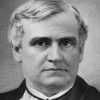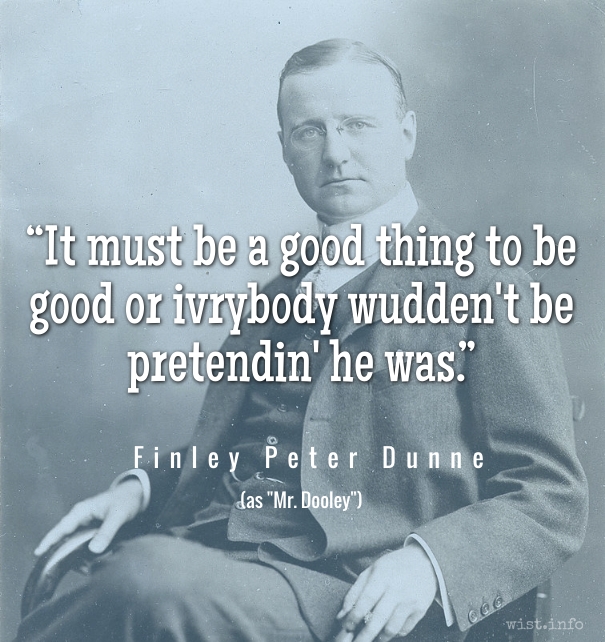Dig within. There lies the well-spring of good: ever dig, and it will ever flow.
[Ἔνδον σκάπτε, ἔνδον ἡ πηγὴ τοῦ ἀγαθοῦ καὶ ἀεὶ ἀναβλύειν δυναμένη, ἐὰν ἀεὶ σκάπτῃς.]
Marcus Aurelius (AD 121-180) Roman emperor (161-180), Stoic philosopher
Meditations [To Himself; Τὰ εἰς ἑαυτόν], Book 7, ch. 59 (7.59) (AD 161-180) [tr. Staniforth (1964)]
(Source)
On how to turn accidents and misfortune into learning experiences and behavior he will approve of in himself.
(Source (Greek)). Alternate translations:Look within; within is the fountain of all good. Such a fountain, where springing waters can never fail, so thou dig still deeper and deeper.
[tr. Casaubon (1634), 7.31]Look Inwards, and turn over your self; For you have a lasting Mine of Happiness at home, if you will but Dig for't.
[tr. Collier (1701), 7.60]Look inwards; within is the fountain of good; which is ever springing up, if you be always digging in it.
[tr. Hutcheson/Moor (1742)]Look into your own bosom; for you have there a fountain of happiness, if you will searcyh for it, and suffer it to flow without interruption.
[tr. Graves (1792), 7.52]Look within. Within is the fountain of good, and it will ever bubble up, if thou wilt ever dig.
[tr. Long (1862)]Look inwards, for you have a lasting fountain of happiness at home that will always bubble up if you will but dig for it.
[tr. Collier/Zimmern (1887)]Dig within. Within is the fountain of good; ever dig, and it will ever well forth water.
[tr. Rendall (1898)]Look inward. Within is the fountain of Good. Dig constantly and it will ever well forth.
[tr. Hutcheson/Chrystal (1902)]Look within. Within is the fountain of Good, ready always to well forth if thou wilt always delve.
[tr. Haines (Loeb) (1916)]Delve within; within is the fountain of good, and it is always ready to bubble up, if you always delve.
[tr. Farquharson (1944)]Dig within; for within you lies the fountain of good, and it can always be gushing forth if only you always dig.
[tr. Hard (1997 ed.)]Dig deep; the water -- goodness -- is down there. And as long as you keep digging, it will keep bubbling up.
[tr. Hays (2003)]Dig inside yourself. Inside there is a spring of goodness ready to gush at any moment, if you keep digging.
[tr. Hammond (2006)]Turn your attention within, for the fountain of all that is good lies within, and it is always ready to pour forth, if you continually delve in.
[tr. Needleman/Piazza (2008)]Dig within; for within you lies the fountain of good, and it can always be gushing forth if only you always dig.
[tr. Hard (2011 ed.)]Search inside yourself; inside you is the fountain of goodness, and it continues to surge as long as you search.
[ed. Taplin (2016)]
Quotations about:
goodness
Note not all quotations have been tagged, so Search may find additional quotes on this topic.
This haz alwus bin the rule, and alwus will be — no man iz grate unless he iz good.
[This has always been the rule, and always will be — no man is great unless he is good.]
Josh Billings (1818-1885) American humorist, aphorist [pseud. of Henry Wheeler Shaw]
Everybody’s Friend, Or; Josh Billing’s Encyclopedia and Proverbial Philosophy of Wit and Humor, ch. 281 “Variety: Bred and Butter” (1874)
(Source)
The good and straightforward person should resemble one who stinks of goat, in the sense that whoever comes close will immediately sense him, whether they want to or not.
[τοιοῦτον ὅλως δεῖ τὸν ἁπλοῦν καὶ ἀγαθὸν εἶναι, οἶον γράσωνα, ἵνα ὁ παραστὰς ἅμα τῷ προσελθεῖν, θέλει οὐ θέλει, αἴσθηται.]
Marcus Aurelius (AD 121-180) Roman emperor (161-180), Stoic philosopher
Meditations [To Himself; Τὰ εἰς ἑαυτόν], Book 11, ch. 15 (11.15) [tr. Needleman/Piazza (2008)]
(Source)
(Source (Greek)). Alternate translations:Such must he be for all the world, that is truly simple and good, as he whose arm-holes are offensive, that whosoever stands by, as soon as ever he comes near him, may as it were smell him whether he will or no.
[tr. Casaubon (1634), 11.14]I would have Honesty so incorporated with the Constitution, so mixed up with the Blood and Spirits, that it should be discoverable by the Sences, and as easily distinguish'd as Rankness, or a strong Breath; so that a Man must be forced to find it out whether he would or no.
[tr. Collier (1701)]The man of simplicity and goodness should, in this, resemble such as have a disagreeable smell in their arm-pits; his disposition should be perceived by all who approach him, whether they will or not.
[tr. Hutcheson/Moor (1742)]A truly good and sincere man should be so palpably such, that no one could be a moment in his company or approach him, without being sensibly and necessarily convinced of it.*
*The expression in the original is rather coarse; which the translators have rather heightened than shorted as they might have done.
[tr. Graves (1792)]The man who is honest and good ought to be exactly like a man who smells strong, so that the bystander as soon as he comes near him must smell whether he choose or not.
[tr. Long (1862)]Goodness, true and simple, should be like musk, so redolent that, will-he nill-he, every one who draws near perceives its fragrance.
[tr. Rendall (1898)]The straightforward, good man should be like one of rank odour who can be recognised by the passer by as soon as he approaches, whether he will or no.
[tr. Hutcheson/Chrystal (1902)]The simple and good man should in fact be like a man who has a strong smell about him, so that, as soon as ever he comes near, his neighbour is, will-he nill-he, aware of it.
[tr. Haines (Loeb) (1916)]The simple and good man ought to be entirely such, like the unsavoury man, that those who stand by detect him at once, whether he will or not, as soon as he comes near.
[tr. Farquharson (1944)]Sincerity and goodness ought to have their own unmistakable odor, so that one who encounters this becomes straightaway aware of it despite himself.
[tr. Staniforth (1964)]A good and honest man should be so right through, like one who smells like a goat, so that anyone who comes near him is immediately aware of it whether he wishes it or not.
[tr. Hard (1997 ed.)]A straightforward, honest person should be like someone who stinks: when you're in the same room as them, you know it.
[tr. Hays (2003)]In short, the good and honest man should have the same effect as the unwashed -- anyone close by as he passes detects the aura, willy-nilly, at once.
[tr. Hammond (2006)]In short, a good and honest person should resemble one who smells like a goat in this respect, that anyone who comes near him is immediately aware of it whether he wishes it or not.
[tr. Hard (2011 ed.)]A person who is honest and good is immediately seen as such even by people who were not looking for any such assurance.
[tr. McNeill (2019)]
Not every great man is a great human being.
[Nicht jeder große Mann is ein großer Mensch.]
Marie von Ebner-Eschenbach (1830-1916) Austrian writer
Aphorisms [Aphorismen], No. 267 (1880) [tr. Scrase/Mieder (1994)]
(Source)
(Source (German)). Alternate translation:Not every great man is a grand human being.
[tr. Wister (1883)]
Being good is better far than seeming so.
[Refert sis bonus, an velis videri.]
Martial (AD c.39-c.103) Spanish Roman poet, satirist, epigrammatist [Marcus Valerius Martialis]
Epigrams [Epigrammata], Book 8, epigram 38 (8.38.7) (AD 94) [tr. Francis & Tatum (1924), ep. 415]
(Source)
(Source (Latin)). Alternate translations:'Tis better bee, than seeme, good.
[16th C Manuscript]'Tis not the same,
To covet and to merit a good name.
[tr. Hay (1755)]Bounteous to be, or seem; the distance wide!
[tr. Elphinston (1782); Book 2, ep. 111]It makes a difference whether a man is, or only wishes to seem, good.
[tr. Bohn's Classical (1859)]It matters much whether thou'rt truly good, or would'st appear so.
[ed. Harbottle (1897)]Wide is the difference 'twixt goodness and pretence.
[tr. Ker (1919)]... the great gulf ’twixt goodness and pretence.
[tr. Pott & Wright (1921)]There is a difference between goodness and pretence.
[tr. Shackleton Bailey (1993)]
Count heads. That is what matters in all things. When you must, follow the common taste, and make your way toward eminence. The wise should adapt themselves to the present, even when the past seems more attractive, both in the clothes of the soul and of the body. This rule for living holds for everything but goodness, for one must always practice virtue.
[El gusto de las cabeças haze voto en cada orden de cosas. Ésse se ha de seguir por entonces, y adelantar a eminencia. Acomódese el cuerdo a lo presente, aunque le parezca mejor lo pasado, así en los arreos del alma como del cuerpo. Sólo en la bondad no vale esta regla de vivir, que siempre se ha de practicar la virtud.]
Baltasar Gracián y Morales (1601-1658) Spanish Jesuit priest, writer, philosopher
The Art of Worldly Wisdom [Oráculo Manual y Arte de Prudencia], § 120 (1647) [tr. Maurer (1992)]
(Source)
(Source (Spanish)). Alternate translations:Let a prudent man accommodate himself to the present, whether as to body, or mind, though the past may even seem better unto him. In manners onely that rule is not to be observed, seeing vertue is at all times to be practised.
[Flesher ed. (1685)]In everything the taste of the many carries the votes; for the time being one must follow it in the hope of leading it to higher things. In the adornment of the body as of the mind adapt yourself to the present, even though the past appear better. But this rule does not apply to kindness, for goodness is for all time.
[tr. Jacobs (1892)]The choice of the many carries the vote in every field. For the time being, therefore, it must be bowed to, in order to bring it to higher level: the man of wisdom accommodates himself to the present, even though the past seems better, alike in the dress of his spirit, as in the dress of his body. Only in the matter of being decent does this rule of life not apply, for virtue should be practiced eternally.
[tr. Fischer (1937)]
All other knowledge is harmful to him who has not the knowledge of goodness.
[Toute autre science, est dommageable à celuy qui n’a la science de la bonté.]
Michel de Montaigne (1533-1592) French essayist
Essays, Book 1, ch. 24 (1.24), “Of Pedantry [Du pedantisme]”(1572-1578) [tr. Ives (1925), ch. 25]
(Source)
While the original essay dates back to 1572-1578 and the first edition, this passage was added 1588–1592 for the 1595 edition.
(Source (French)). Alternate translations:Each other science is prejudciall unto him that hath not the science of goodnesse.
[tr. Florio (1603)]All other knowledge is detrimental to him who has not the science of becoming a good man.
[tr. Cotton (1686); Friswell (1868)]All other knowledge is hurtful to him who has not the science of goodness.
[tr. Cotton/Hazlitt (1877)]All other learning is hurtful to him who has not the knowledge of honesty and goodness.
[tr. Rector (1899)]Any other knowledge is harmful to a man who has not the knowledge of goodness.
[tr. Frame (1943), ch. 25]All other knowledge is harmful in a man who has no knowledge of what is good.
[tr. Screech (1987), ch. 25]
Truth and goodness are the same for all people. But pleasure varies from one to another.
Ἀνθρώποις πᾶσι τωὐτὸν ἀγαθὸν καὶ ἀληθές· ἡδὺ δὲ ἄλλωι ἄλλο.
Democritus (c. 460 BC - c. 370 BC) Greek philosopher
Frag. 69 (Diels) [tr. @sententiq (2018), fr. 68]
(Source)
Diels citation "69. (6 N.) DEMOKRATES. 34.". Freeman notes this as one of the Gnômae, from a collection called "Maxims of Democratês," but because Stobaeus quotes many of these as "Maxims of Democritus," they are generally attributed to the latter. Alternate translations:
- "For all men, good and true are the same; but pleasant differs for different men." [tr. Freeman (1948)]
- "The same thing is good and true for all men. But what is pleasant differs from one to another." [Warren (2008)]
- "Goodness and truth are the same for all men: but pleasure differs from man to man." [Source]
The most beautiful people we have known are those who have known defeat, known suffering, known struggle, known loss, and have found their way out of the depths. These persons have an appreciation, a sensitivity, and an understanding of life that fills them with compassion, gentleness, and a deep loving concern. Beautiful people do not just happen.
Elisabeth Kübler-Ross (1926-2004) Swiss-American psychiatrist, author
Death: The Final Stage of Growth (1975)
(Source)
No man or woman of the humblest sort can really be strong, gentle, pure, and good, without the world being the better for it, without somebody being helped and comforted by the very existence of that goodness.
He’s a good person, you know. In spite of many things, including his own opinion, he’s a good person. Maybe a bit conceited, overbearing, and arrogant, but then, people without a trace of these diseases aren’t usually worth one’s time.
I used to be very revolutionary, but now I think that nothing can be gained by brute force. People must be drawn to good by goodness.
Boris Pasternak (1890-1960) Russian poet, novelist, and literary translator
Doctor Zhivago [До́ктор Жива́го], Part 2, ch. 8 “Arrival,” sec. 5 [Yury] (1955) [tr. Hayward & Harari (1958), US ed.]
(Source)
Alternate translations:I used to be very revolutionary-minded, but now I think that nothing can be gained by violence. People must be drawn to good by goodness.
[tr. Hayward & Harari (1958), UK ed.]I used to be in a very revolutionary mood, but now I think that we'll gain nothing by violence. People must be drawn to the good by the good.
[tr. Pevear & Volokhonsky (2010)]
That observation which is called knowledge of the world will be found much more frequently to make men cunning than good.
Samuel Johnson (1709-1784) English writer, lexicographer, critic
The Rambler, #4 (31 Mar 1750)
(Source)
ALBANY: Wisdom and goodness to the vile seem vile.
Filths savor but themselves.William Shakespeare (1564-1616) English dramatist and poet
King Lear, Act 4, sc. 2, l. 47ff (4.2.47-48) (1606)
(Source)
It may well be that the greatest tragedy of this period of social transition is not the glaring noisiness of the bad people, but the appalling silence of the good people. It may be that our generation will have repent not only for the diabolical actions and vitriolic words of the children of darkness, but also for the crippling fears and tragic apathy of the children of light.
Martin Luther King, Jr. (1929-1968) American clergyman, civil rights leader, social activist, preacher
“The Christian Way of Life in Human Relations,” speech, General Assembly fo the National Council of Churches, St Louis (4 Dec 1957)
(Source)
Often paraphrased: "We will have to repent in this generation not merely for the hateful words and actions of the bad people but for the appalling silence of the good people." See also here.
Trust in another’s goodness is no light testimony to one’s own.
[La fiance de la bonté d’autruy, est un non leger tesmoignage de la bonté propre]
Michel de Montaigne (1533-1592) French essayist
Essays, Book 1, ch. 14 (1.14), “The Taste of Good and Bad Things Depends Mostly on the Opinion We Have of Them [Que le goust des biens et des maux despend en bonne partie de l’opinion que nous en avons]” (1572) [tr. Screech (1987)]
(Source)
Writing admirably of an elderly prelate who had turned over management of his household and wealth to a succession of trusted servants.
This essay was in the 1st ed. (1580), but was expanded substantially for subsequent editions. This passage first appeared in the 3rd edition (1595). It is in Book 1, number 40 in most older translations; some more recent ones (as noted) number it as 14.
(Source (French)). Alternate translations:The confidence in others honestie, is no light testimonie of ones owne integritie [Confidence in others’ honesty is no light testimony of one’s own integrity].
[tr. Florio (1603)]The confidence of another Mans vertue, is no light evidence of a Mans own.
[tr. Cotton (1686)]The confidence in another man's virtue is no light evidence of a man's own.
[tr. Cotton/Hazlitt (1877)]Confidence in another's goodness is no slight testimony of one's own goodness.
[tr. Ives (1925), 1.14]Confidence in the goodness of others is no slight testimony to one's own goodness.
[tr. Frame (1943), 1.14]Trust in the goodness of others truly testifies to the goodness in ourselves.
[tr. HyperEssays (2025)]























